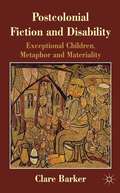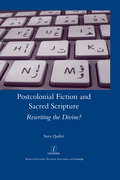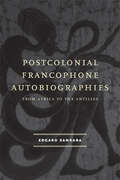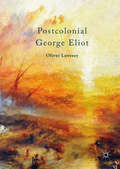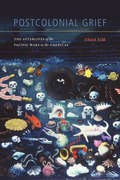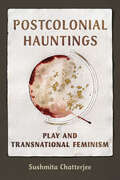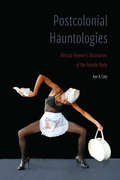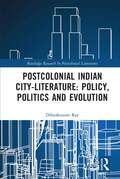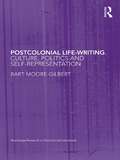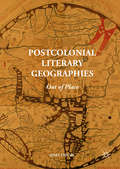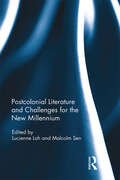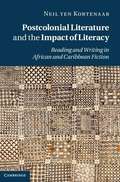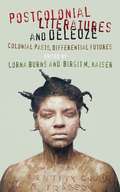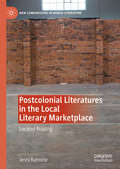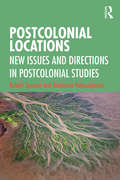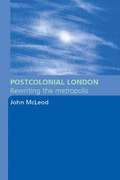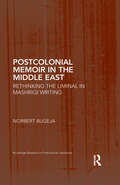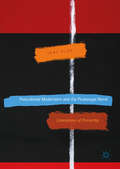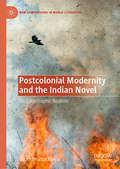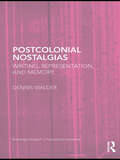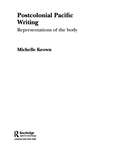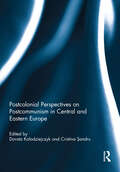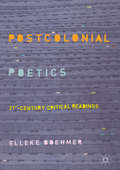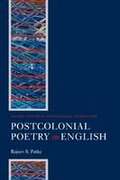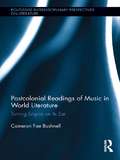- Table View
- List View
Postcolonial Fiction and Disability
by Clare BarkerThis book is the first study of disability in postcolonial fiction. Focusing on canonical novels, it explores the metaphorical functions and material presence of disabled child characters. Barker argues that progressive disability politics emerge from postcolonial concerns, and establishes dialogues between postcolonialism and disability studies.
Postcolonial Fiction and Sacred Scripture: Rewriting the Divine?
by Sura Qadiri"Francophone writers from North Africa and the Middle East often choose to write within a sacred context, sometimes engaging directly with Islamist rhetoric. Novelists like Tahar Ben Jelloun (Morocco), Assia Djebar (Algeria) and Amin Maalouf (Lebanon) revisit scripture as a way to convey nuances which they believe have been stamped out by monolithic religious world-views. For them, fiction offers a way to break away from limited exegetical horizons, but to remain within the faith. Others, though, would go further, moving away from all religious practice, not just the excessively political or violent. Tunisian writers Abdelwahab Meddeb and Fethi Benslama propose that all literature is of its very nature outside of religion, and that its proliferation will ultimately lead to a secular society. Qadiri explores this wide spectrum of approaches, not only by draw comparison with metropolitan French thought, but also to assess its potential impact at a time of radical change in the Islamic world. Sura Qadiri is a research associate in the French Department, University of Cambridge."
Postcolonial Francophone Autobiographies: From Africa to the Antilles
by Edgard SankaraBringing a comparative perspective to the study of autobiography, Edgard Sankara considers a cross-section of postcolonial francophone writing from Africa and the Caribbean in order to examine and compare for the first time their transnational reception. Sankara not only compares the ways in which a wide selection of autobiographies were received locally (as well as in France) but also juxtaposes reception by the colonized and the colonizer to show how different meanings were assigned to the works after publication.Sankara’s geographical and cultural coverage of Africa and its diaspora is rich, with separate chapters devoted to the autobiographies of Hampâté Bâ, Valentin Mudimbé, Kesso Barry, Patrick Chamoiseau, Raphaël Confiant, and Maryse Condé. The author combines close reading, reception study, and postcolonial theory to present an insightful survey of the literary connections among these autobiographers as well as a useful point of departure for further exploration of the genre itself, of the role of reception studies in postcolonial criticism, and of the stance that postcolonial francophone writers choose to take regarding their communities of origin.Modern Language Initiative
Postcolonial George Eliot
by Oliver LoveseyThis book examines the range of the colonial imaginary in Eliot's works, from the domestic and regional to ancient and speculative colonialisms. It challenges monolithic, hegemonic views of George Eliot -- whose novelistic career paralleled the creation of British India -- and also dismissals of the postcolonial as ahistorical. It uncovers often-overlooked colonized figures in the novels. It also investigates Victorian Islamophobia in light of Eliot's impatience with ignorance, intolerance, and xenophobia as well as her interrogation of the make-believe of endings. Drawing on a range of sources from Eug#65533;ne Bodichon's Algerian anthropological texts, the Persian journals of John Martyn, and postmodern re-engagements, Postcolonial George Eliot has implications for an understanding of the globalization of English, the decolonization of disciplinarity and periodization, and the roots of present-day conflict in the wider Mediterranean world.
Postcolonial Grief: The Afterlives of the Pacific Wars in the Americas
by Jinah KimIn Postcolonial Grief Jinah Kim explores the relationship of mourning to transpacific subjectivities, aesthetics, and decolonial politics since World War II. Kim argues that Asian diasporic subjectivity exists in relation to afterlives because the deaths of those killed by U.S. imperialism and militarism in the Pacific remain unresolved and unaddressed. Kim shows how primarily U.S.-based Korean and Japanese diasporic writers, artists, and filmmakers negotiate the necropolitics of Asia and how their creative refusal to heal from imperial violence may generate transformative antiracist and decolonial politics. She contests prevalent interpretations of melancholia by engaging with Frantz Fanon's and Hisaye Yamamoto's decolonial writings; uncovering the noir genre's relationship to the U.S. war in Korea; discussing the emergence of silenced colonial histories during the 1992 Los Angeles riots; and analyzing the 1996 hostage takeover of the Japanese ambassador's home in Peru. Kim highlights how the aesthetic and creative work of the Japanese and Korean diasporas offers new insights into twenty-first-century concerns surrounding the state's erasure of military violence and colonialism and the difficult work of remembering histories of war across the transpacific.
Postcolonial Hauntings: Play and Transnational Feminism (Dissident Feminisms)
by Sushmita ChatterjeeOften examined separately, play and hauntings in fact act together to frame postcolonial issues. Sushmita Chatterjee showcases their braided workings in social and political fabrics. Drawing on this intertwined idea of play and hauntings, Chatterjee goes to the heart of conundrums within transnational postcolonial feminisms by examining the impossible echoes of translations, differing renditions of queer, and the possibilities of solidarity beyond the fraternal friendships that cement nation-states. Meaning-plays, or slippages through language systems as we move from one language to another, play a pivotal role in a global world. As Chatterjee shows, an attentiveness to meaning-plays discerns the past and present, here and there, and moves us toward responsive ethics in our theories and activisms. Insightful and stimulating, Postcolonial Hauntings centers the inextricable work of play and hauntings as a braided ethics for postcolonial transnational struggles.
Postcolonial Hauntologies: African Women's Discourses of the Female Body (Expanding Frontiers: Interdisciplinary Approaches to Studies of Women, Gender, and Sexuality)
by Ayo A. ColyPostcolonial Hauntologies is an interdisciplinary and comparative analysis of critical, literary, visual, and performance texts by women from different parts of Africa. While contemporary critical thought and feminist theory have largely integrated the sexual female body into their disciplines, colonial representations of African women’s sexuality “haunt” contemporary postcolonial African scholarship which—by maintaining a culture of avoidance about women’s sexuality—generates a discursive conscription that ultimately holds the female body hostage. Ayo A. Coly employs the concept of “hauntology” and “ghostly matters” to formulate an explicative framework in which to examine postcolonial silences surrounding the African female body as well as a theoretical framework for discerning the elusive and cautious presences of female sexuality in the texts of African women. In illuminating the pervasive silence about the sexual female body in postcolonial African scholarship, Postcolonial Hauntologies challenges hostile responses to critical and artistic voices that suggest the African female body represents sacred ideological-discursive ground on which one treads carefully, if at all. Coly demonstrates how “ghosts” from the colonial past are countered by discursive engagements with explicit representations of women’s sexuality and bodies that emphasize African women’s power and autonomy.
Postcolonial Indian City-Literature: Policy, Politics and Evolution (Routledge Research in Postcolonial Literatures)
by Dibyakusum RayHow is the city represented through literature from the post-colonies? This book looks for an answer to this question, by keeping its focus on India –from after Independence to the millennia. How does the urban space and the literature depicting it form a dialogue within? How have Indian cities grown in the past six decades, as well as the literature focused on it? How does the city-lit depart from organic realism to dissonant themes of ‘reclamation’? Most importantly – who does the city (and its narratives) belong to? Through the juxtaposition of critical theories, urban studies and variant literary works by a wide range of Indian authors, this book is divided into four temporal phases: the nation-building of the 50-60s, the dictatorial 70s, the neoliberalization of the 80-90s and the early 2000s. Each section covers the dominant socio-political thematics of the time and its effect on urbanism along with historical data from various resources, followed by an analysis of contemporaneously significant literary works-- novel, short stories, plays, poetry and graphic novel. Each chapter comments on how literature frames real and imagined constructs and experiences of cities. To give the reader a more expansive idea of the complex nature of city-lit, the literary examples abound not only "Indian Writings in English", but vernacular, cult-works as well with suitable translations. With its focus on philosophy, urban studies and a unique canon of literature, this book offers elements of critical discussion to researchers, emergent university disciplines and curious readers alike.
Postcolonial Life-Writing: Culture, Politics, and Self-Representation (Routledge Research in Postcolonial Literatures)
by Bart Moore-GilbertPostcolonial Life-Writing is the first attempt to offer a sustained critique of this increasingly visible and influential field of cultural production. Bart Moore-Gilbert considers the relationship between postcolonial life-writing and its western analogues, identifying the key characteristics that differentiate the genre in the postcolonial context. Focusing particularly on writing styles and narrative conceptions of the Self, this book uncovers a distinctive parallel tradition of auto/biographical writing and analyses its cultural and political significance. Original and provocative, this book brings together the two distinct fields of Postcolonial Studies and Auto/biography Studies in a fruitful and much needed dialogue.
Postcolonial Literary Geographies
by John ThiemeThis book examines how ideas about place and space have been transformed in recent decades. It offers a unique understanding of the ways in which postcolonial writers have contested views of place as fixed and unchanging and are remapping conceptions of world geography, with chapters on cartography, botany and gardens, spice, ecologies, animals and zoos, and cities, as well as reference to the importance of archaeology and travel in such debates. Writers whose work receives detailed attention include Amitav Ghosh, Derek Walcott, Jamaica Kincaid, Salman Rushdie, Michael Ondaatje and Robert Kroetsch. Challenging both older colonial and more recent global constructions of place, the book argues for an environmental politics that is attentive to the concerns of disadvantaged peoples, animal rights and ecological issues. Its range and insights make it essential reading for anyone interested in the changing physical and human geography of the contemporary world.
Postcolonial Literature and Challenges for the New Millennium
by Lucienne Loh Malcolm SenThis volume brings together an international range of postcolonial scholars to explore four distinct themes which are inherently interconnected within the globalised landscape of the early 21st century: China, Islamic fundamentalism, civil war and environmentalism. Through close-reading a range of literary texts by writers drawn from across the globe, these essays seek to emphasise the importance of literary aesthetics in situating the theoretical underpinnings and political motivations of postcolonial studies in the new millennium. Colonial legacies, especially in terms of structuring exploitative capitalist relations between countries and regions are shown to persist in postcolonial nations in the form of ‘global civil wars’ and systemic environmental waste. Chinese authoritarianism and the Indian picturesque represent less familiar forms of neo-colonialism. These essays not only engage with established writers such as Salman Rushdie and Anita Desai; they also critically reflect on work by Nadeem Aslam, Mai Couto, Romesh Gunesekara, Bei Dao and Ma Jian. This book was originally published as a special issue of Textual Practice.
Postcolonial Literature and the Impact of Literacy
by Neil Ten KortenaarExamining images of literacy in African and West Indian novels, Neil ten Kortenaar looks at how postcolonial authors have thought about the act of writing itself. Writing arrived in many parts of Africa as part of colonization in the twentieth century, and with it a whole world of book-learning and paper-pushing; of school and bureaucracy; newspapers, textbooks and letters; candles, hurricane lamps and electricity; pens, paper, typewriters and printed type; and orthography developed for formerly oral languages. Writing only penetrated many layers of West Indian society in the same era. The range of writers is wide, and includes Chinua Achebe, Wole Soyinka and V. S. Naipaul. The chapters rely on close reading of canonical novels, but discuss general themes and trends in African and Caribbean literature. Ten Kortenaar's sensitive and penetrating treatment of these themes makes this an important contribution to the growing field of postcolonial literary studies.
Postcolonial Literatures and Deleuze
by Lorna BurnsBringing together high profile scholars in the fields of Deleuze and postcolonial studies, this book highlights the overlooked connections between two major schools of contemporary criticism and establishes a new critical discourse for postcolonial literature and theory.
Postcolonial Literatures in the Local Literary Marketplace: Located Reading (New Comparisons in World Literature)
by Jenni RamoneThis book asks what reading means in India, Nigeria, the UK, and Cuba, through close readings of literary texts from postcolonial, spatial, architectural, cartographic, materialist, trauma, and gender perspectives. It contextualises these close readings through new interpretations of local literary marketplaces to assert the significance of local, not global meanings. The book offers longer case studies on novels that stage important reading moments: Alejo Carpentier’s The Lost Steps (1953), Leonardo Padura’s Adios, Hemingway (2001), Tabish Khair’s Filming (2007), Chibundhu Onuzo’s Welcome to Lagos (2017), and Zadie Smith’s Swing Time (2016). Chapters argue that while India’s literary market was disrupted by Partition, literature offers a means of moving beyond trauma; in post-Revolutionary Cuba, the Special Period led to exploitation of Cuban literary culture, resulting in texts that foreground reading spaces; in Nigeria, the market hosts meeting, negotiation, reflection, and trade, including the writer’s trade; while Black consciousness bookshops and writing in Britain operated to challenge the UK literary market, a project still underway. This book is a vindication of reading, and of the resistant power and creative potential of local literary marketplaces. It insists on ‘located reading’, enabling close reading of world literatures sited in their local materialities.
Postcolonial Locations: New Issues and Directions in Postcolonial Studies
by Robert Spencer Anastasia ValassopoulosPostcolonial Locations seeks to clarify the meaning of ‘the postcolonial’ through close textual readings, and prioritises material and located readings over more abstract theoretical discussions; it seeks to re-orient the field by providing practical explorations of what the discipline is for. The book begins with an introduction of the key theoretical debates in the field – between the universal and the particular; the global and the local – but it then goes on to demonstrate, via a series of close textual readings, that these distinctions are not always useful and that we can achieve a more comprehensive and complete reading of the multiple times, places and texts in which colonial power is both exerted and fought. An engaging and comprehensive guide to contemporary postcolonial studies, this book is essential reading for students as well as professors.
Postcolonial London: Rewriting the Metropolis
by John McLeodLondon's histories of migration and settlement and the resulting diverse, hybrid communities have engendered new forms of social and cultural activity reflected in a wealth of novels, poems, films and songs. Postcolonial London explores the imaginative transformation of the city by African, Asian, Caribbean and South Pacific writers since the 1950s. John McLeod engages freshly with the work of both well-known and emergent writers, including Sam Selvon, Doris Lessing, V. S. Naipaul, Salman Rushdie, Hanif Kureishi, Colin MacInnes, Bernardine Evaristo, Linton Kwesi Johnson and Fred D'Aguiar. In reading a select body of writing in its social contexts and exploring contrasting attitudes to London's diasporic transformation, he traces an exciting history of resistance to the prejudice and racism that have at least in part characterised the postcolonial city. Rewritings of London, he argues, bear witness to the determination, imagination and creativity of the city's migrants and their descendants. This is a superb study of the ways in which 'imperial centre' might be rewritten as postcolonial metropolis. It represents essential reading for those interested in British or postcolonial literature, or in theorisations of the city and metropolitan culture.
Postcolonial Memoir in the Middle East: Rethinking the Liminal in Mashriqi Writing (Routledge Research in Postcolonial Literatures)
by Norbert BugejaThis book reconsiders the notion of liminality in postcolonial critical discourse today. By visiting Mashriqi writers of memoir, Bugeja offers a unique intervention in the understanding of 'in-between' and ‘threshold’ states in present-day postcolonialist thought. His analysis situates liminal space as a fraught form of consciousness that mediates between conditions of historical contingency and the memorializing present. Within the present Mashriqi memoir form, liminal spaces may be read as articulations of 'representational spaces' — narrative spaces that, based as they are within the histories of local communities, are nonetheless redolent with memorial and imaginary elements. Liminal consciousness today, Bugeja argues, is a direct consequence of the impact of volatile present-day memories on the re-conception of the open wounds of history. Incisive readings of life-writings by Mourid Barghouti, Amin Maalouf, Orhan Pamuk, Amos Oz, and Wadad Makdisi Cortas demonstrate the double-edged representational chasm that opens up when present acts of memorializing are brought to bear upon the elusive histories of the early-twentieth-century Mashriq. Sifting through the wide-ranging theoretical literature on liminality and challenging received views of the concept, this book proposes a nuanced, materialist, and original rethinking of the liminal as a more vigilant outlook onto the political, literary and historical predicaments of the contemporary Middle East.
Postcolonial Modernism and the Picaresque Novel
by Jens ElzeThis book is about the contemporary picaresque novel. Despite its popularity, the picaresque, unlike the bildungsroman, is still an undertheorized genre, especially for the context of postcolonial literatures. This study considers the picaresque novel's traditional focus on poverty and deprivation, and argues that its postcolonial versions urge us to conceive of as a more wide-ranging sense of precarity and precariousness. Non-linear biography, episodic style, protean identities, unreliable narratives, and abject landscapes are the social and formal aspects through which this precarity is thematized and performed. A concise analysis of these concepts and phenomena in the picaresque provides the structure for this book. What is especially significant in comparison to other forms of postcolonial (post)modernism is that the picaresque does not offer a general critique of a project of modernity, but through its persistent precarity points to the paradoxical logics of capitalism, which are especially nuanced under the conditions of neo-imperialism and neoliberalism. The book features texts by established postcolonial authors such as Salman Rushdie and V. S. Naipaul, but especially focuses on the more recent proliferation of the genre in works by Aravind Adiga, Mohsin Hamid and Indra Sinha.
Postcolonial Modernity and the Indian Novel: On Catastrophic Realism (New Comparisons in World Literature)
by Sourit BhattacharyaThis book argues that modernity in postcolonial India has been synonymous with catastrophe and crisis. Focusing on the literary works of the 1943 Bengal Famine, the 1967–72 Naxalbari Movement, and the 1975–77 Indian Emergency, it shows that there is a long-term, colonially-engineered agrarian crisis enabling these catastrophic events. Novelists such as Bhabani Bhattacharya, Mahasweta Devi, Salman Rushdie, Rohinton Mistry, Nabarun Bhattacharya, and Nayantara Sahgal, among others, have captured the relationship between the long-term crisis and the catastrophic aspects of the events through different aesthetic modalities within realism, ranging from analytical-affective, critical realist, quest modes to apparently non-realist ones such as metafictional, urban fantastic, magical realist, and others. These realist modalities are together read here as postcolonial catastrophic realism.
Postcolonial Nostalgias: Writing, Representation and Memory (Routledge Research In Postcolonial Literatures Ser. #31)
by Dennis WalderThis book offers an original and informed critique of a widespread yet often misunderstood condition — nostalgia, a pervasive human emotion connecting people across national and historical as well as personal boundaries. Often seen as merely escapist, nostalgia also offers solace and self-understanding for those displaced by the larger movements of our time. Walder analyses the writings of some of those entangled in the aftermath of empire, tracing the hidden connections underlying their yearnings for a common identity and a homeland, and their struggles to recover their histories. Through a series of comparative reflections upon the representation in literary and related cultural forms of memory, he shows how admitting the past into the present through nostalgia enables former colonial or diasporic subjects to gain a deeper understanding of the networks of power within which they are caught in the modern world — and beyond which it may yet be possible to move. Considering authors as varied as V.S Naipaul, J.G. Ballard, Doris Lessing, W.G. Sebald, and Chimamanda Ngozi Adichie, as well as versions of ‘Bushman’ song, Walder pursues the often wayward, ambiguous paths of nostalgia as it has been represented beyond, but also within, Europe, so as to identify some of those processes of communal and individual experience that constitute the present and, by implication, the future.
Postcolonial Pacific Writing: Representations of the Body (Routledge Research in Postcolonial Literatures #Vol. 9)
by Michelle KeownThis major new interdisciplinary study focuses on the representation of the body in the work of eight of Polynesia's most significant contemporary writers. Drawing on anthropology, psychoanalysis, philosophy, history and medicine, Postcolonial Pacific Writing develops an innovative postcolonial framework specific to the literatures and cultures of this region.
Postcolonial Perspectives on Postcommunism in Central and Eastern Europe
by Dorota Kołodziejczyk and Cristina ŞandruA quarter of a century after the fall of the Berlin Wall, and from the vantage point of a post-Cold War, globalised, world, there is a need to address the relative neglect of postcommunism in analysis of postcolonial and neo-colonial configurations of power and influence. This book proposes new critical perspectives on several themes and concepts that have emerged within, or been propagated by, postcolonial studies. These themes include structures of exclusion/ inclusion; formations of nationalism, structures of othering, and representations of difference; forms and historical realisations of anti-colonial/anti-imperial struggle; the experience of trauma (involving issues of collective memory/amnesia and the re-writing of history); resistance as a complex of cultural practices; and concepts such as alterity, ambivalence, self-colonisation, dislocation, hegemonic discourse, minority, and subaltern cultures. Taken together, this volume suggests that some of the methodological instruments of postcolonial criticism can be fruitfully applied to the study of postcommunist cultures and, conversely, that the experience of the Soviet brand of imperialist rule in the form of communism in East-Central Europe can function as an ideological moderator in Third-World oriented, Marxist-inspired, postcolonial discourses. This book was originally published as a special issue of the Journal of Postcolonial Writing.
Postcolonial Poetics: 21st-Century Critical Readings
by Elleke BoehmerPostcolonial Poetics is about how we read postcolonial and world literatures today, and about how the structures of that writing shape our reading. The book’s eight chapters explore the ways in which postcolonial writing in English from various 21st-century contexts, including southern and West Africa, and Black and Asian Britain, interacts with our imaginative understanding of the world. Throughout, the focus is on reading practices, where reading is taken as an inventive, border-traversing activity, one that postcolonial writing with its interests in margins, intersections, subversions, and crossings specifically encourages. This close, sustained focus on reading, reception, and literariness is an outstanding feature of the study, as is its wide generic range, embracing poetry, essays, and life-writing, as well as fiction. The field-defining scholar Elleke Boehmer holds that literature has the capacity to keep reimagining and refreshing how we understand ourselves in relation to the world and to some of the most pressing questions of our time, including resistance, reconciliation, survival after terror, and migration.
Postcolonial Poetry In English
by Rajeev S. PatkeThis book introduces readers to a body of poetry whose unique relation to language and history gives it a dual role in contemporary societies. On the one hand, this poetry bears witness to the residual force of colonial histories; on the other, it shows how that force may be turned to new forms of linguistic and cultural empowerment. Many books with 'postcolonial' in their titles ignore or marginalize the genre of poetry. Others address it within the boundaries of a single nation or region. Their insights leave room for another kind of project, which establishes connections between contemporary poetry and colonial history, and provides comparisons between the literary decolonization of societies linked
Postcolonial Readings of Music in World Literature (Routledge Interdisciplinary Perspectives on Literature)
by Cameron Fae BushnellThis book reads representations of Western music in literary texts to reveal the ways in which artifacts of imperial culture function within contemporary world literature. Bushnell argues that Western music’s conventions for performance, composition, and listening, established during the colonial period, persist in postcolonial thought and practice. Music from the Baroque, Classical, and Romantic periods (Bach through Brahms) coincides with the rise of colonialism, and Western music contains imperial attitudes and values embedded within its conventions, standards, and rules. The book focuses on the culture of classical music as reflected in the worlds of characters and texts and contends that its effects outlast the historical significance of the real composers, pieces, styles, and forms. Through examples by authors such as McEwan, Vikram Seth, Bernard MacLaverty, Chang-rae Lee, and J.M. Coetzee, the book demonstrates how Western music enters narrative as both acts of history and as structures of analogy that suggest subject positions, human relations, and political activity that, in turn, describes a postcolonial condition. The uses to which Western music is put in each literary text reveals how European art music of the seventeenth through the nineteenth centuries is read and misread by postcolonial generations, exposing mostly hidden cultural structures that influence our contemporary understandings of social relations and hierarchies, norms for resolution and for assigning significance, and standards of propriety. The book presents strategies for thinking anew about the persistence of cultural imperialism, reading Western music simultaneously as representative of imperial, cultural dominance and as suggestive of resistant structures, forms, and practices that challenge the imperial hegemony.
